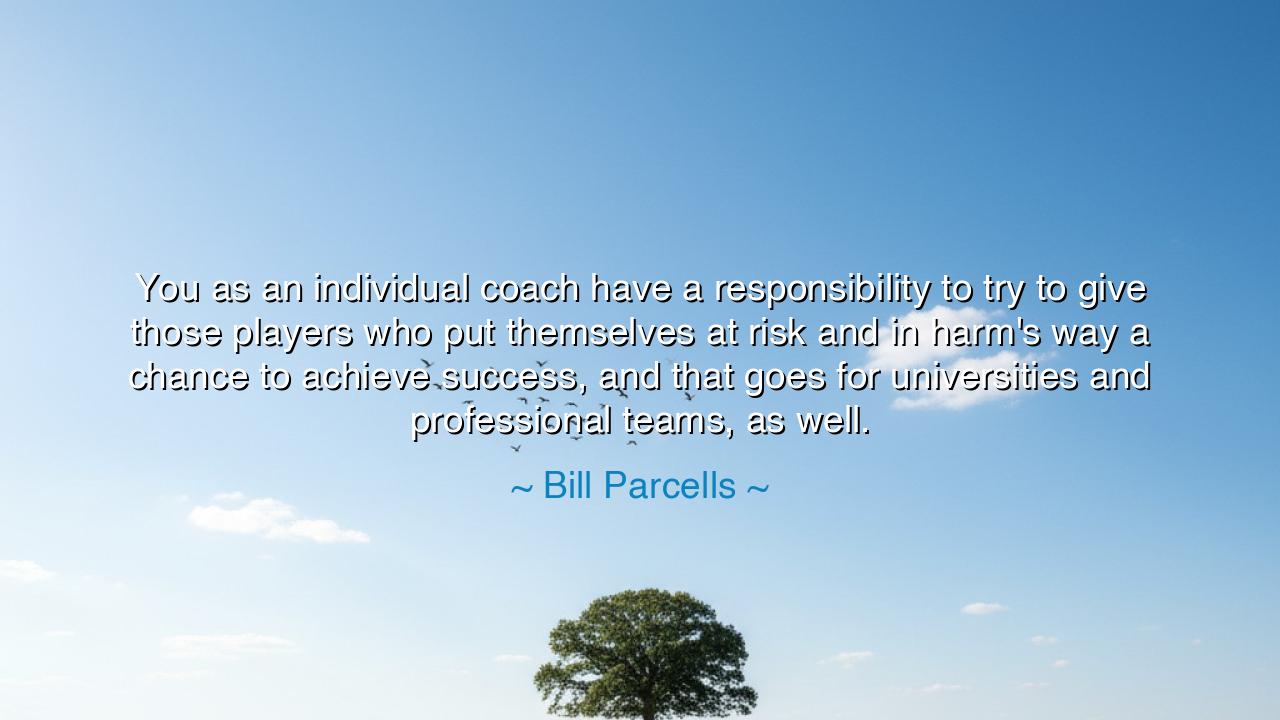
You as an individual coach have a responsibility to try to give
You as an individual coach have a responsibility to try to give those players who put themselves at risk and in harm's way a chance to achieve success, and that goes for universities and professional teams, as well.






"You as an individual coach have a responsibility to try to give those players who put themselves at risk and in harm's way a chance to achieve success, and that goes for universities and professional teams, as well." These words by Bill Parcells reflect the great responsibility that comes with guiding others, especially when they place themselves in vulnerable positions for the sake of achievement. Parcells highlights the moral and ethical duty of a coach—whether at the university or professional level—to not just teach or train, but to ensure that the players under their charge are protected, supported, and given the opportunity to succeed. It is not enough to simply demand performance; the coach must provide the necessary environment for growth and success, especially for those who risk their bodies and their futures in pursuit of greatness.
This understanding of responsibility in mentorship and leadership can be traced back to ancient philosophy. In Plato's Republic, Socrates argued that the role of a teacher—be it in politics, philosophy, or any other field—was to guide the individual toward the greater good, not merely to extract labor or obedience. A leader’s duty, according to Socrates, is to help those under their guidance flourish as whole individuals, to give them the tools to succeed and to ensure that the society they build is one that values justice and virtue. In this way, Parcells' quote is a reflection of the ancient idea that leadership should not be about dominance or simply pushing others to succeed, but about ensuring that those who follow you have the proper foundation to rise.
The idea of duty to those who take risks for a greater cause is echoed in the Roman tradition as well. Cicero, the great statesman and philosopher, often spoke of the role of the leader to guide and protect those they led. In his On Duties, Cicero outlined the moral responsibility of those in positions of power, urging them to act with both wisdom and compassion. A leader should ensure that those who follow them are not merely exploited, but are given a chance to flourish, both for their own benefit and for the benefit of the larger community. This idea resonates deeply with Parcells' philosophy: coaches and leaders must give their players—not just opportunities, but the tools to succeed in a way that honors their well-being and potential.
Consider the ancient example of Alexander the Great. Alexander, though a conqueror who led many into battle, had a deep responsibility to the men who followed him. His soldiers risked their lives, traveling thousands of miles across harsh terrains in pursuit of glory and empire, and it was Alexander’s duty to ensure that their sacrifices were not in vain. He rewarded their loyalty with opportunities for wealth and land, and provided guidance on strategy and leadership. Alexander's success as a leader was not just in his ability to lead men into battle, but in his ability to give them the chance to achieve success, even in the most difficult circumstances. His leadership demonstrated that the best leaders are those who create opportunities for their followers to rise, even when the stakes are high.
In more modern history, Vince Lombardi, the legendary football coach, exemplified a similar philosophy. Lombardi’s coaching style was famously intense, but he also believed that his job was to help each player reach their fullest potential. Lombardi’s commitment to teamwork, discipline, and personal growth meant that he didn’t just focus on the performance of his players, but also on their personal development. His players knew that their success on the field was tied not only to their ability to execute plays, but also to the integrity and character they developed under his guidance. Like Parcells, Lombardi saw his role not just as a taskmaster, but as a mentor and guide—someone who was deeply invested in the success and well-being of those he led.
The lesson in Parcells’ words is one of leadership rooted in care and responsibility. A leader’s job is not only to demand results but to ensure that those who follow are given the opportunity to succeed in a way that supports their growth and safety. This requires more than just teaching skills or giving orders; it requires a deep commitment to the well-being of others and the moral responsibility to create an environment where they can thrive. Leaders must be aware of the risks their followers take and ensure that those risks are balanced with the chance for success and the opportunity to grow.
In practical terms, this philosophy can be applied in all areas of life—whether as coaches, mentors, parents, or leaders in any capacity. Our responsibility is not only to push others toward their goals but to ensure that we provide the necessary support, guidance, and opportunity for them to succeed in a safe and sustainable way. Whether it is in the workplace, education, or family, the chance to succeed must always come with protection, opportunity, and the understanding that the risks involved must be justified by the rewards of growth and development.
Thus, let us remember Parcells’ words as we lead others. Leadership is not just about results, but about providing the tools, environment, and guidance necessary for others to achieve their best. Like the great leaders of the past, we must not only ensure victory but also take responsibility for the well-being and growth of those we lead. In doing so, we create a world where people are not just exploited for their efforts, but are truly given a chance to flourish—both as individuals and as part of something greater than themselves.






AAdministratorAdministrator
Welcome, honored guests. Please leave a comment, we will respond soon